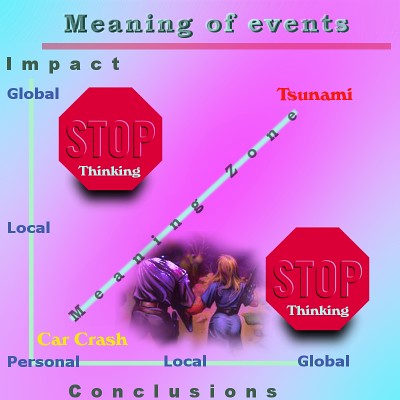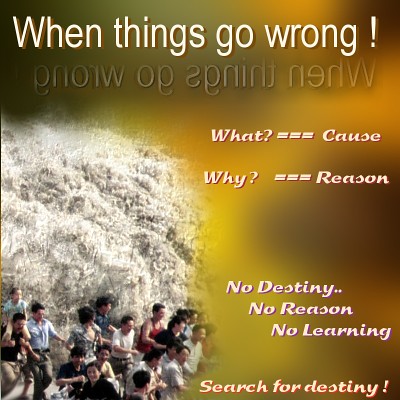Even if we do our utmost best in life,
Sometimes Shit Happens
All kind of Shit, like accidents, divorces, dead or health problems could be messing up our lives.
When dealing with Shit, we may ask the "What" and the "Why" question.
First we may analyze de cause of the shit (the What question).
- What caused the Shit?
- Did I cause it myself or did somebody else do this?
- Could I prevent this kind of Shit or not?
But perhaps more important is the "Why" question
- Why did this happen?
- Why did it happen to me, my friend or my enemy?
- Why did it happen now and not later or earlier?
- Is there a reason why this happened?
Answering the
Why question, could give us the meaning of this Shit that happened in our life.
Let's distinguish between several events that could happen to us in life.
Suppose you got caught in a car crash.
This is not a global, but a personal event, with mainly personal impact.
If the accident was caused by you, you could raise the why-question to yourself.
If the accident was caused by someone else who - for instance - was drunk and got on the wrong side of the road, things become more difficult.
The meaning, sense or reason of such an accident is often not personal, but more local. People in your environment learn from this that drinking alcohol and driving don't go together.
However, questions that you could raise in these kind of situations are:
Why was I there, at that moment, with what reason? And, could I have reacted differently?
Global events, like a tsunami or an earthquake, have an enormous personal impact on us, but no personal conclusions (in terms of meaning) can be drawn.
In these kind of events
life may seem unfair from a personal point of view. These events only have a
global meaning. Only global conclusions, like 'building stronger houses', can be drawn here.
The reason why such events take place are on a global scale. They concern the life and development of the earth as a hole.
Things like humans, animals, corals or whatever are of minor importance than the greater goal : survival of the Earth.

So in general we may conclude that from local (global) Shit-events we may often draw personal (global) conclusions with a personal (global) meaning.
You could say that local events have a local reason and global events have a global reason. Don't mix them up!
But perhaps you think that
Things happen without a reason ?As we've seen, this may seam so, because reasons are sometimes global and not personal.
But perhaps you think there are no reasons in life, and everything - Shit and Good - is just
random happening, without a meaning?
In this case you probably also think you've got no destination?
Because events in life only have a meaning if you have a goal, a destination. Not chosen by yourself, but by the universe.
So if you think
There's a destination in lifeyou'll search for the reason that Shit happened to you. By learning from the reason's that caused this Shit, you'll be able to reframe yourself and still reach your final (but sometimes hidden) personal destination. In a way you could say the environment (universe) helps you to reach your destination by generating Shit if you don't decide in line with your destination.

In a way you could say that the meaning of Shit happening in your life depends on
what you believe.
Redefine, self-redefine, Shit as
Shit Helps In Thinking









